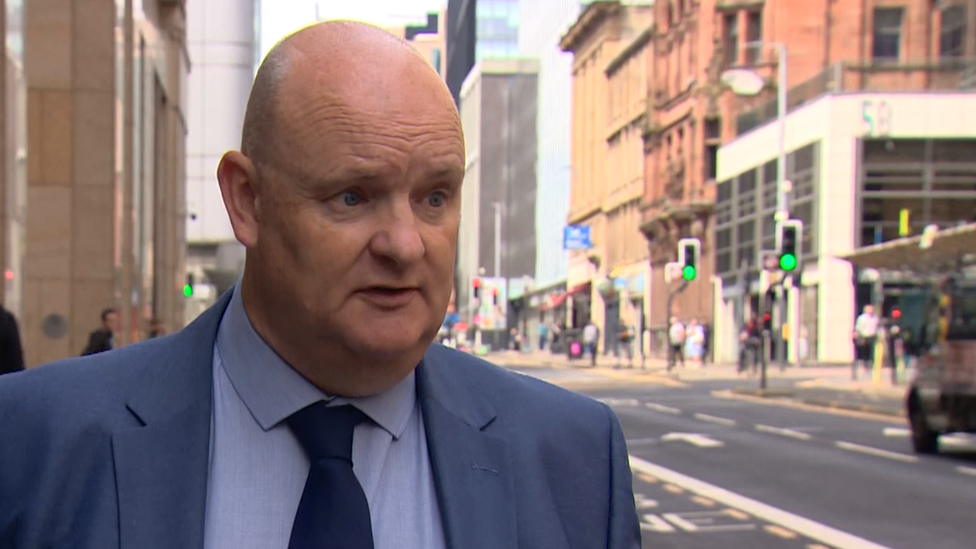Scottish union boss quits Labour over picket row
- Published

Aslef's Kevin Lindsay is backing calls for the union to cut ties with Labour
A Scottish union boss has resigned from the Labour Party over the sacking of a shadow transport minister who joined striking rail workers on a picket line.
Labour said Sam Tarry had been dropped from Sir Keir Starmer's front bench for making unauthorised media appearances.
But the UK party leader has also told his shadow team not to join pickets.
Kevin Lindsay, Scotland organiser for the Aslef union, said the sacking was "a step too far" and that Sir Keir was failing to stand up for workers.
He is calling for the rail group to cut its ties with Labour altogether, saying the party was "more interested in trying to woo Tory voters in the shires of England than representing working people".
And he contrasted Sir Keir's leadership with the "fantastic" support of Scottish party boss Anas Sarwar, who attended a rail strike in June, external.
Mr Tarry gave media interviews from a picket line at Euston station alongside members of the RMT union on Wednesday, amid rail strikes which brought services across the UK to a halt.
He said he had been "standing shoulder to shoulder in solidarity with striking workers", and had been dismissed from his role for "joining a picket line".
However, Labour denied this was the reason for the Ilford South MP's dismissal, saying that shadow ministers needed to sign up to collective responsibility which includes "media appearances being approved and speaking to agreed frontbench positions".
In a statement, the party said it would "always stand up for working people fighting for better pay, terms and conditions at work".
Watch: Sam Tarry responds to being sacked by Starmer
The move has been criticised by a number of trade unions, with GMB's Gary Smith calling it a "huge own goal" and Sharon Graham of Unite saying Labour was "becoming more and more irrelevant to ordinary working people".
Kevin Lindsay, Scotland organiser for the rail union Aslef, has now resigned his membership of the party.
His resignation letter said Mr Tarry's sacking was "just a step too far", adding that Labour was "becoming unrecognisable from the party I joined and have stayed loyal to".
He said Sir Keir's policies were "making if impossible for the Labour Party to return to power", calling for him to be removed from the leadership.
Mr Lindsay said that the party in Scotland "have performed better", highlighting the "fantastic" support of Mr Sarwar and the party's transport spokesman Neil Bibby.
Several Scottish Labour MSPs were also among those to post messages of solidarity to Mr Tarry online, with Monica Lennon saying the party "should never run away from promoting the rights and interests of workers and how this benefits our society".
Speaking on Thursday, Sir Keir said Mr Tarry had been sacked for giving interviews "without permission" and for "making up policy on the hoof".


While Labour is officially insisting this was about unauthorised media appearances, Mr Tarry was clearly - and deliberately - in breach of Sir Keir Starmer's ban on shadow cabinet members joining pickets.
That ban is part of his wider project to make Labour seem more electable to the country at large - a party of power rather than one of protest, that wins elections rather than arguments.
But there is a major tension between it and the party's traditional position, with its base rooted in the trade union movement.
An interesting divergence has also appeared with the Scottish party, which Mr Lindsay highlighted in his resignation letter.
This will be welcome in a sense to Anas Sarwar, who is always keen to underline that his group is a separate entity from the UK party and not just a "branch office".
But it is another headache for Sir Keir, who would far rather be keeping the public's focus on the Conservative leadership race.